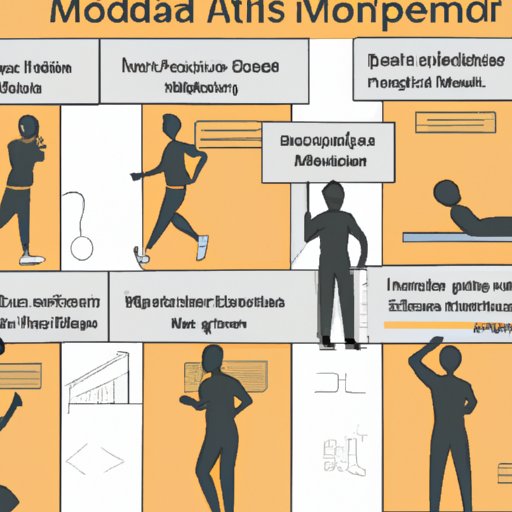
Introduction: What is Moderate Exercise and Its Benefits
Moderate exercise is any physical activity that increases your heart rate, breathing rate, and causes you to break a sweat. It’s an important part of maintaining a healthy lifestyle and can help reduce stress, improve your mood, and increase your overall well-being. There are many different types of moderate exercises that you can try, including walking, swimming, cycling, yoga, and strength training.
According to the Centers for Disease Control and Prevention (CDC), adults should do at least 150 minutes of moderate intensity aerobic activity or 75 minutes of vigorous activity each week. This includes anything from brisk walking to jogging and swimming.

How to Incorporate Moderate Exercise into Your Routine
Incorporating moderate exercise into your routine doesn’t have to be difficult. Here are some tips on how to get started:
Identify Your Goals
Start by identifying your goals. What do you hope to achieve through moderate exercise? Do you want to lose weight, gain muscle, or simply stay fit? Setting specific goals will make it easier for you to create a plan and track your progress.
Develop a Plan
Once you’ve identified your goals, it’s time to develop a plan. Think about what type of moderate exercise you’d like to do, how much time you can commit, and when you’ll do it. Having a plan in place will help keep you motivated and on track.
Make Time for Exercise
Making time for exercise can be challenging, especially if you have a busy schedule. However, it’s important to prioritize physical activity. Try to find ways to fit moderate exercise into your daily routine, such as taking a walk during your lunch break or doing yoga before bed.
The Benefits of Moderate Exercise for Different Age Groups
The benefits of moderate exercise extend to people of all ages. From children to elderly adults, regular physical activity can help improve physical and mental health.
Children
Physical activity is especially important for children. According to a study published in the International Journal of Behavioral Nutrition and Physical Activity, children who are physically active have better academic performance and are more likely to engage in positive social behaviors.
Adults
For adults, moderate exercise can help reduce the risk of chronic diseases such as heart disease and diabetes. It can also improve cognitive function, reduce stress levels, and increase energy levels.
Elderly
Older adults can also benefit from regular physical activity. A study published in the journal Aging Clinical and Experimental Research found that older adults who engaged in moderate exercise had improved mobility and balance, which can reduce the risk of falls.

Types of Moderate Exercises You Can Try
There are many types of moderate exercises you can try, depending on your fitness level and goals. Here are some examples:
Walking
Walking is one of the easiest and most accessible forms of exercise. It’s low impact and can be done almost anywhere. All you need is a good pair of shoes and you’re ready to go.
Swimming
Swimming is a great form of moderate exercise because it’s low impact and provides a full body workout. It’s also a great way to cool off in hot weather.
Cycling
Cycling is another great form of moderate exercise. It’s easy on the joints and can be done indoors or outdoors. Plus, it’s a great way to explore your local area.
Yoga
Yoga is a gentle form of exercise that focuses on stretching, breathing, and mindfulness. It’s a great way to increase flexibility and reduce stress.
Strength Training
Strength training is an important part of any fitness routine. It can help build muscle, improve posture, and reduce the risk of injury.
A Guide to Starting a Moderate Exercise Program
If you’re new to exercise, it’s important to start slowly and work your way up. Here are some tips for starting a moderate exercise program:
Start Slow
It’s important to start slow and gradually increase your activity level. Begin with 10 minutes of light exercise and gradually work your way up to 30 minutes of moderate exercise.
Find the Right Equipment
Having the right equipment is key. Make sure you have the proper shoes, clothing, and gear for whatever type of exercise you’re doing.
Listen to Your Body
It’s important to listen to your body and adjust your routine as needed. If something hurts or feels uncomfortable, take a break or switch to a different activity.
Common Mistakes to Avoid When Doing Moderate Exercise
While moderate exercise can be beneficial, there are some mistakes to avoid. Here are some of the most common mistakes to watch out for:
Overdoing It
It’s important not to overdo it. Start slow and gradually increase your activity level. Don’t push yourself too hard or you may end up injured.
Not Stretching
Stretching is an important part of any exercise routine. It helps improve flexibility and reduce the risk of injury. Make sure to stretch before and after each session.
Skimping on Hydration
Hydration is essential for any physical activity. Make sure to drink plenty of water before, during, and after your workout.
Conclusion
Moderate exercise offers many physical and mental health benefits for all age groups. Whether you’re a child, an adult, or an elderly adult, there are many types of moderate exercises that you can do. Remember to set realistic goals, develop a plan, and make time for exercise. Be sure to listen to your body and avoid common mistakes such as overdoing it and skimping on hydration.
(Note: Is this article not meeting your expectations? Do you have knowledge or insights to share? Unlock new opportunities and expand your reach by joining our authors team. Click Registration to join us and share your expertise with our readers.)
